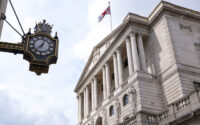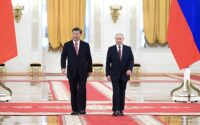Global inflation may be close to its peak, IMF director says | Inflation
Global inflation could be peaking, the head of the International Monetary Fund has said, but she warned that consumers were at risk of facing persistent pressure from rising living costs due to a breakdown in world supply chains.
Kristalina Georgieva, the IMF’s managing director, said there were signs the global surge in consumer prices since the Covid pandemic and exacerbated by Russia’s war in Ukraine was close to its apex.
“It is very possible that we are peaking,” she said in an interview with Bloomberg TV from the Cop27 climate summit in Egypt. “We now see central banks very united on fighting inflation as a top priority and rightly so. If we don’t succeed, it would de-anchor and then the foundation for growth which is price stability is dented.”
However, the head of the Washington-based fund warned that a fragmentation in global manufacturing supply chains could make it harder to push measured inflation rates back down to the levels seen in recent years before the Covid pandemic.
“We actually think inflation is going to be harder to bring down to the desirable level of around 2%. Why? Because the drivers of deflation are not only supply [and] demand disruption, but also a changing cost structure that comes from the realisation that, no more, we make economic decisions only on the basis of cost.
“Supply chain security also matters. If we are going to see diversification of supply chains, that inevitably is going to put some upward pressure on prices.”
In its annual health check on the world economy published last month, the IMF forecast that global inflation would peak at 9.5% in the third quarter of 2022 before falling back to about 4.1% by 2024.
Global investors in financial markets are watching closely for signs of a peak in world inflation amid anticipation that major central banks will begin to pivot away from using big interest rate increases to combat soaring living costs.
However, economists warn that inflationary pressures could prove more persistent than in the past, given heightened geopolitical tensions and a global reconfiguration of manufacturers’ supply chains. In response to severe disruption during the Covid pandemic, businesses have pushed to source supplies from closer to home, even if this means higher prices.
The Bank of England said last week it expected inflation in the UK to peak at just under 11% in October, before falling back substantially over the following year. Driven by soaring energy prices and the rising cost of food and drink, inflation in the UK rose to 10.1% in September, the highest rate since 1982.
Threadneedle Street said there were signs that supply chain conditions had improved in recent months, while a slowdown in the world economy was weighing on demand for goods and services. Global shipping costs have fallen back in recent weeks, and oil and gas prices on wholesale markets have also dropped.
Last week, the Bank raised interest rates by 0.75 percentage points to 3%, the biggest single rise in borrowing costs since 1989, despite warning that Britain risked being plunged into its longest recession in 100 years.
[ad_2]
Source link


